10 Best Herbal Baths For Baldness

Herbal baths for baldness involve the use of specific plants and natural ingredients believed to stimulate hair growth and improve scalp health.
Common herbs used in these baths include rosemary, sage, nettle, and fenugreek, which are thought to enhance blood circulation and nourish the scalp. These baths are typically prepared by boiling the herbs in water and allowing the steam to open the pores, or by soaking the hair in the infused water. While some studies suggest that certain herbs may support hair growth, more research is needed to confirm their effectiveness for baldness.
Overall, herbal baths can be a soothing and natural complement to other hair care routines, though they should not replace medical treatments for more severe cases of hair loss.
Table of Contents
- 1. Field horsetail (Equisetum arvense)
- 2. Stinging nettle (Urtica dioica)
- 3. Blessed thistle (Cnicus benedictus)
- 4. Turmeric (Curcuma longa)
- 5. Salvia (Salvia officinalis)
- 6. Pogostemon (Pogostemon cablin)
- 7. Goatweed (Eclipta prostrata)
- 8. Aloe vera (Aloe barbadensis)
- 9. Ginger (Zingiber officinale)
- 10. St. john's wort (Hypericum perforatum)
1. Field horsetail (Equisetum arvense)

Equisetum arvense, commonly known as horsetail, has been traditionally used in herbal baths for its purported ability to stimulate hair growth and combat baldness.
The plant is rich in silica, which is believed to strengthen hair strands and improve scalp health. When infused into bath water, horsetail may help increase blood circulation to the scalp, promoting a healthier environment for hair follicles. However, while some anecdotal evidence supports its use, scientific studies on its effectiveness for baldness are limited.
As with any herbal remedy, it is advisable to consult a healthcare professional before incorporating horsetail baths into a hair care routine.
2. Stinging nettle (Urtica dioica)

Urtica dioica, commonly known as stinging nettle, has been traditionally used in herbal baths for various health benefits, including potential support for hair growth.
When used in a bath, the compounds in stinging nettle may help stimulate blood circulation to the scalp, which can promote healthier hair follicles. Some proponents believe that the minerals and nutrients in nettle leaves can nourish the scalp and strengthen hair roots. However, there is limited scientific evidence directly linking urtica dioica baths to the prevention or treatment of baldness.
As with any herbal remedy, it is advisable to consult a healthcare professional before incorporating it into a hair care routine.
3. Blessed thistle (Cnicus benedictus)
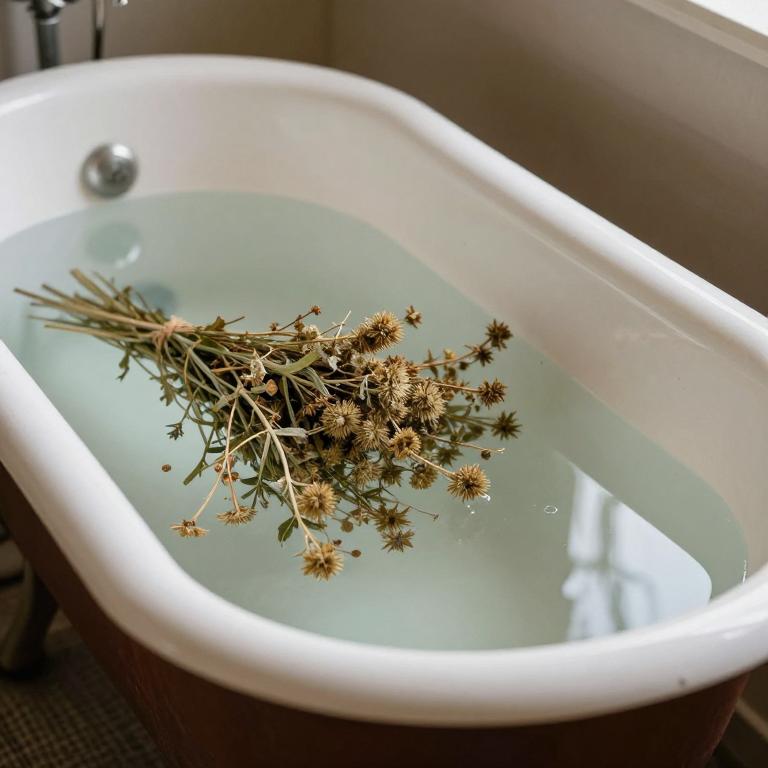
Cnicus benedictus, commonly known as Saint Benedict's weed, has been traditionally used in herbal baths to address hair loss and promote scalp health.
The plant contains compounds that may stimulate blood circulation to the scalp, potentially encouraging hair growth. Herbal baths with Cnicus benedictus are believed to nourish the hair follicles and reduce inflammation, which can contribute to baldness. To use it, the dried plant is often steeped in hot water and then applied to the scalp as a rinse or added to bath water for a soothing effect.
While anecdotal evidence suggests it may support hair regrowth, scientific research on its effectiveness for baldness is limited, and it should be used in conjunction with other proven treatments under professional guidance.
4. Turmeric (Curcuma longa)
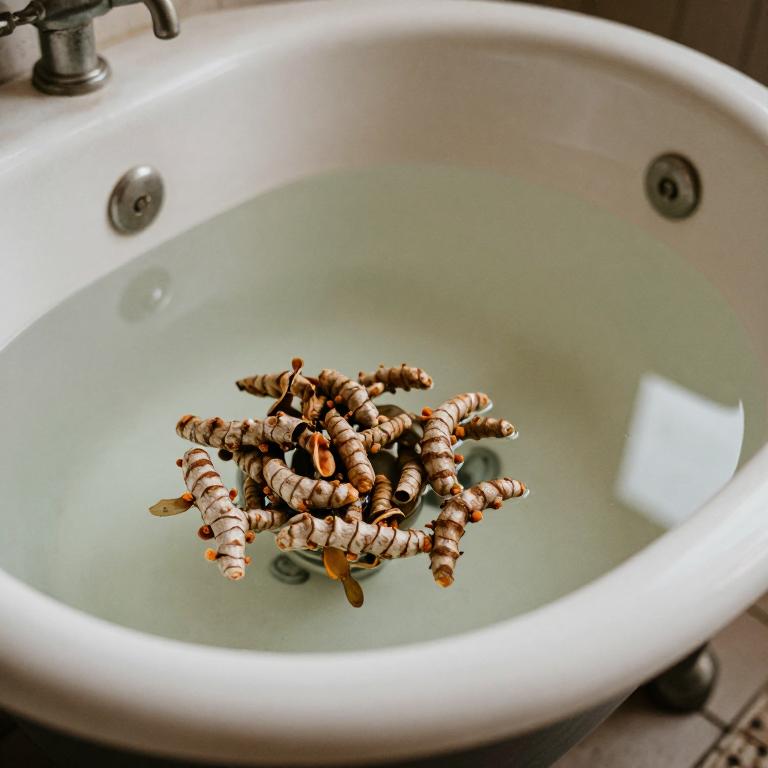
Curcuma longa, commonly known as turmeric, has been traditionally used in herbal remedies for its potential health benefits, including its anti-inflammatory and antioxidant properties.
While there is no scientific evidence directly linking turmeric baths to hair growth, some individuals use turmeric in bath water to improve scalp health and potentially stimulate hair follicles. Turmeric's active compound, curcumin, may help reduce scalp inflammation and improve blood circulation, which could indirectly support hair growth. However, it is important to note that baldness can have various causes, such as genetics, hormonal changes, or medical conditions, and turmeric baths should not be considered a substitute for professional medical advice.
For those seeking natural remedies, incorporating turmeric into a holistic hair care routine may be worth exploring, but results can vary and should be monitored for any adverse reactions.
5. Salvia (Salvia officinalis)

Salvia officinalis, commonly known as sage, has been traditionally used in herbal baths for its purported benefits in promoting hair health and potentially preventing baldness.
The essential oils and compounds in sage, such as thujone and camphor, are believed to stimulate blood circulation in the scalp, which may support hair follicle health. Some herbalists suggest that sage baths can help balance sebum production and reduce scalp inflammation, both of which are factors in hair loss. While there is limited scientific evidence directly linking sage baths to hair regrowth, anecdotal reports and traditional use suggest potential benefits.
As with any herbal remedy, it is advisable to consult a healthcare professional before incorporating sage baths into a hair care routine, especially for those with sensitive skin or existing scalp conditions.
6. Pogostemon (Pogostemon cablin)
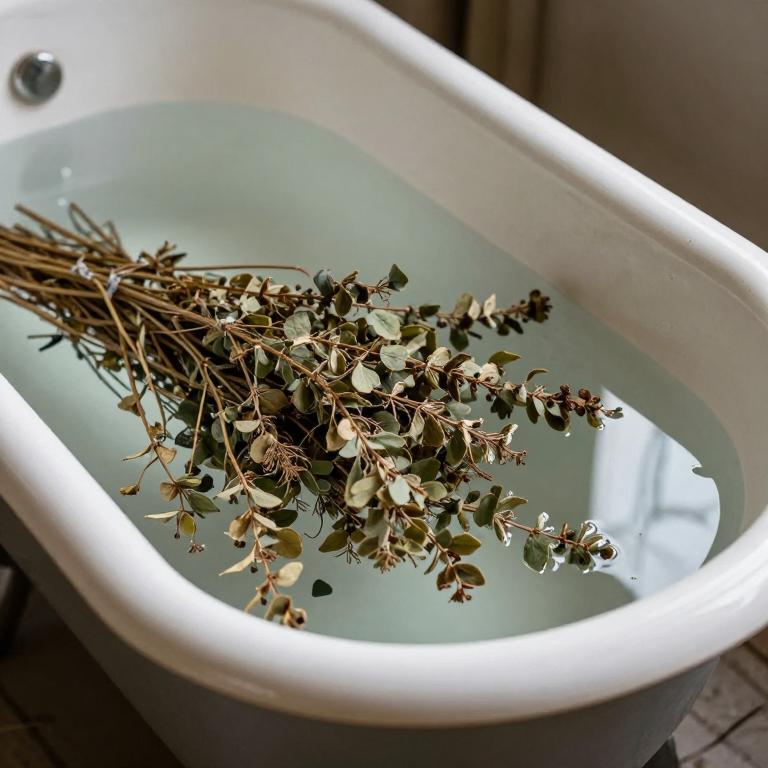
Pogostemon cablin, also known as java tea or citronella grass, has been traditionally used in herbal medicine for its various health benefits, including its potential role in promoting hair growth.
Some herbal practitioners suggest that pogostemon cablin herbal baths may help stimulate scalp circulation, which could support healthy hair follicles and potentially reduce hair loss. The essential oils derived from this plant are believed to have antimicrobial and anti-inflammatory properties that may create a healthier scalp environment. While there is limited scientific research on its direct effects on baldness, some users claim that regular use of pogostemon cablin baths has improved hair thickness and density.
As with any herbal treatment, it is advisable to consult with a healthcare professional before incorporating it into a hair care routine.
7. Goatweed (Eclipta prostrata)
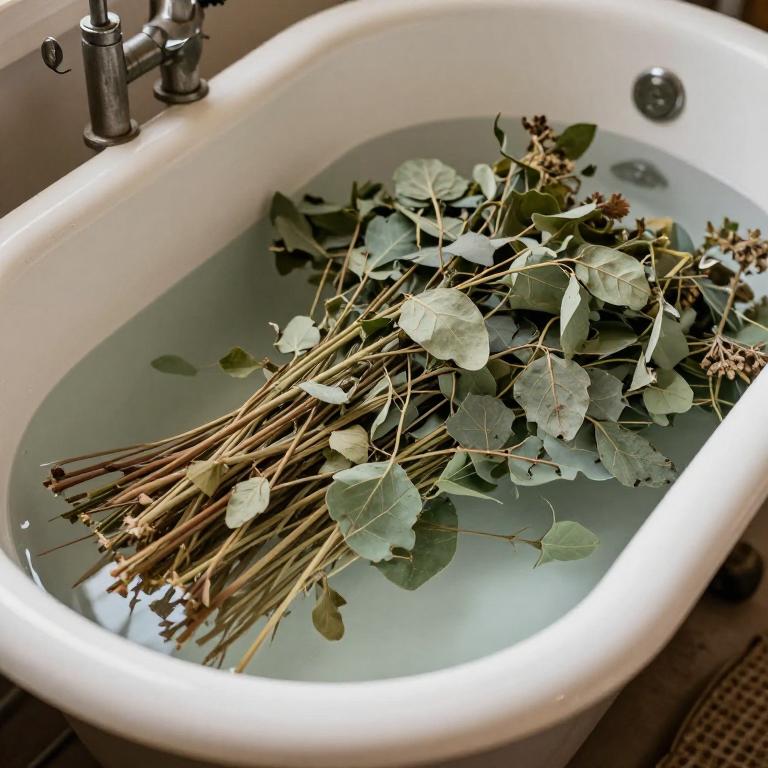
Eclipta prostrata, commonly known as false dandelion, has been traditionally used in herbal medicine for its potential benefits in promoting hair growth and treating baldness.
When used in herbal baths, the plant's extracts are believed to stimulate scalp health and improve blood circulation, which may support hair follicle activity. The anti-inflammatory and antioxidant properties of Eclipta prostrata may help reduce scalp irritation and create a favorable environment for hair regrowth. To prepare an herbal bath, the dried leaves are typically steeped in hot water and then used to rinse the scalp.
While some anecdotal evidence supports its use, more scientific research is needed to fully understand its efficacy for treating baldness.
8. Aloe vera (Aloe barbadensis)
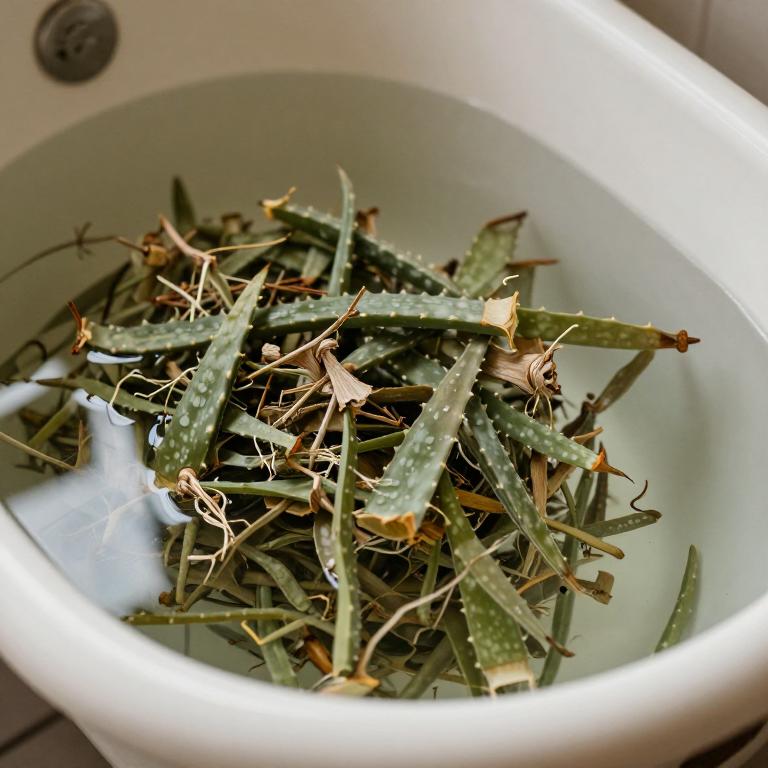
Aloe barbadensis, commonly known as aloe vera, has been traditionally used for its soothing and healing properties, and some people believe it may support hair growth when incorporated into herbal baths.
When used in a bath, aloe vera can help nourish the scalp, reduce inflammation, and promote a healthy environment for hair follicles. However, there is limited scientific evidence directly linking aloe vera baths to the prevention or reversal of baldness. While some studies suggest that aloe vera may stimulate hair growth in certain conditions, more research is needed to confirm its effectiveness for alopecia.
As with any herbal remedy, it is advisable to consult a healthcare professional before using aloe vera baths, especially if you have existing scalp conditions or are undergoing medical treatment.
9. Ginger (Zingiber officinale)

Zingiber officinale, commonly known as ginger, has been traditionally used in herbal baths for its potential benefits in promoting hair health and preventing baldness.
The active compounds in ginger, such as gingerol and shogaol, are believed to stimulate blood circulation to the scalp, which can enhance nutrient delivery to hair follicles and potentially encourage hair growth. Incorporating ginger into herbal baths involves soaking the roots in hot water or using ginger-infused oils to apply to the scalp, which may help reduce inflammation and improve overall scalp health. While there is limited scientific evidence directly linking ginger baths to the prevention of baldness, some studies suggest that ginger's anti-inflammatory and antioxidant properties may support healthy hair growth.
As a natural remedy, ginger baths can be a complementary approach to traditional treatments for hair loss, though consulting a healthcare professional is recommended for persistent or severe cases of baldness.
10. St. john's wort (Hypericum perforatum)

Hypericum perforatum, commonly known as St. John's Wort, has been traditionally used in herbal baths for its purported benefits in promoting hair growth and addressing baldness.
The herb contains compounds like hypericin and flavonoids, which are believed to have anti-inflammatory and antioxidant properties that may support scalp health. When infused into bath water, St. John's Wort is thought to stimulate blood circulation to the scalp, potentially enhancing nutrient delivery to hair follicles. However, it is important to note that scientific evidence supporting its effectiveness for baldness is limited, and some studies suggest it may interact with certain medications.
As with any herbal treatment, it is advisable to consult a healthcare professional before incorporating St. John's Wort baths into a hair care routine.